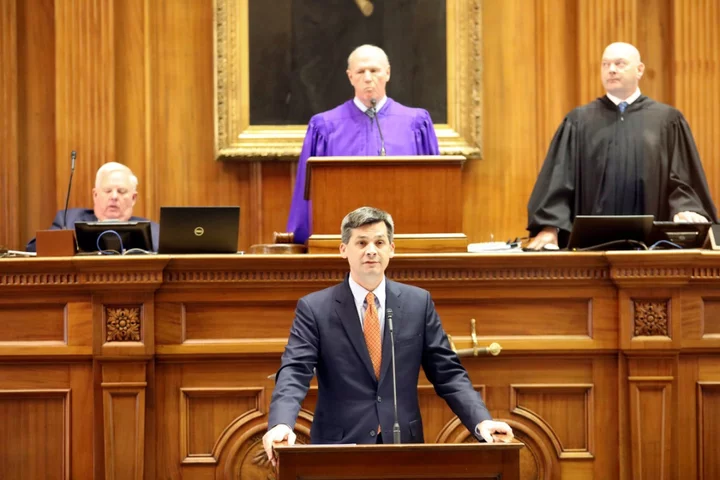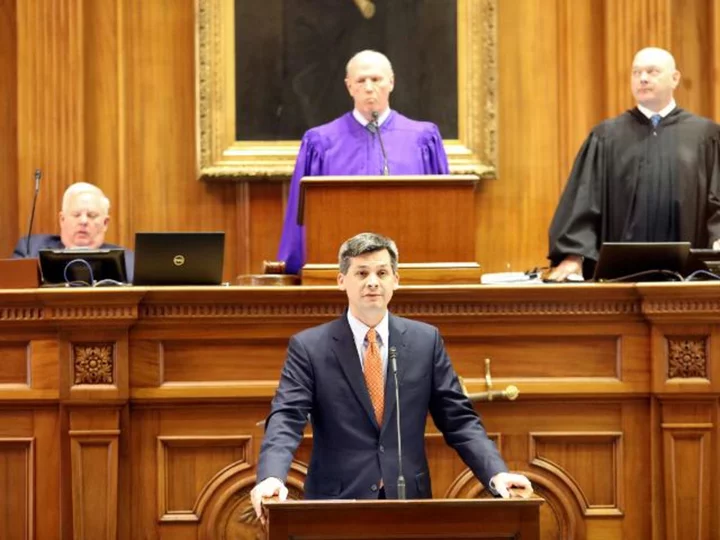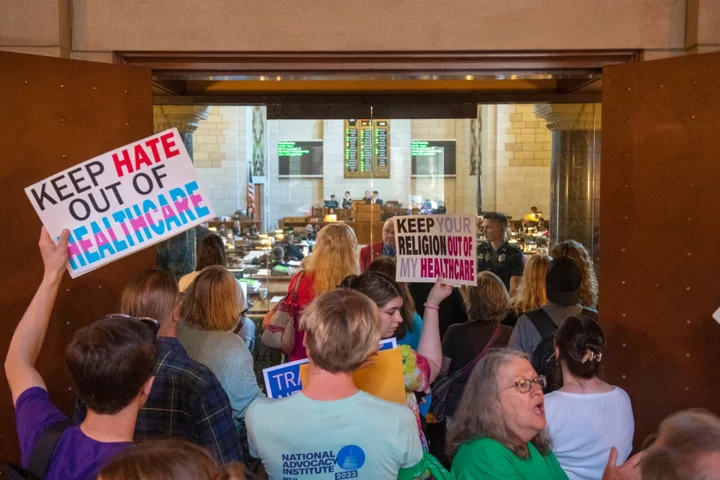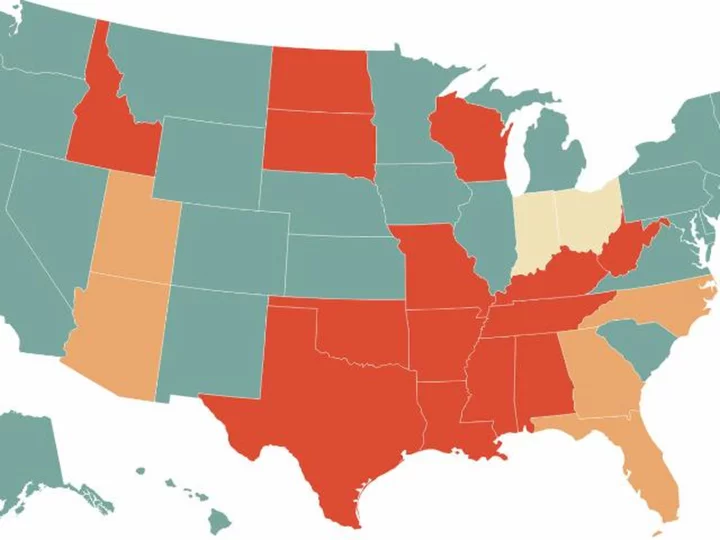
South Carolina governor signs 6-week abortion bill into law
South Carolina Gov. Henry McMaster on Thursday signed a bill into law that will limit most abortions as early as six weeks into a pregnancy.
2023-05-25 23:51

South Carolina passes six-week abortion ban over objections from all women senators
The South Carolina Senate on Tuesday passed a six-week abortion ban despite the fact that every woman senator in the chamber, Republican and Democrat, voted against it. The abortion ban will now go to the desk of Gov Henry McMaster, a Republican. If Mr McMaster does sign the bill as expected, it will be another blow to people seeking abortion care in the southeast. Nearly every other state in the region has enacted abortion bans since the fall of Roe v Wade last year. If Mr McMaster signs the ban into law, it is likely to face a legal challenge. The South Carolina Supreme Court earlier this struck down a previous version of a six-week abortion ban as unconstitutional. But that didn’t stop Republican men in the state legislature and the male Republican governor from pushing to pass a ban anyway. Six-week bans on abortion are considered near total bans because many people don’t know they’re pregnant until more than six weeks after conception. This story will be updated. Read More Haley vs. Scott: From South Carolina allies to 2024 rivals South Carolina Republicans hear pitches from 2024 candidates, reelect state party chairman Republican abortion debate inches toward resolution in South Carolina
2023-05-24 08:20

South Carolina legislature sends 6-week abortion ban to governor's desk
A controversial six-week abortion ban bill is headed to South Carolina Gov. Henry McMaster's desk to be signed into law after the measure cleared the state Senate Tuesday.
2023-05-24 07:51

Nebraska lawmakers block photos of ‘clearly ill’ senator brought from hospital to ensure votes to ban abortion
Republican state legislators in Nebraska rammed through a contentious bill restricting abortion and transgender healthcare last week with the help of a sick colleague who had just gotten out of hospital. Julie Slama, a state GOP senator, confirmed on Friday that she had been receiving treatment for hyperemesis gravidarium, a serious complication of pregnancy, but made it to the statehouse in time to cast a decisive vote. Earlier that day, Nebraska Examiner reporter Paul Hammel had posted a picture of her looking “clearly ill” as colleagues from both sides of the debate stood around her to shield her from TV cameras. According to Hammel, Ms Slama cast the crucial 33rd vote that allowed the bill to overcome a months-long filibuster by progressive senators that had brought Nebraska’s unicameral legislature practically to a standstill. The bill, signed into law by governor Jim Pillen on Monday, bans abortion after 12 weeks of pregnancy, starting immediately, and all gender transition healthcare for trans people under the age of 19, starting in October. “I was hospitalised today with hyperemesis gravidarum,” Ms Slama tweeted on Friday evening. “Made it back in time to vote, and on the most divisive bill of the entire session. “Everyone put their differences aside and joined in a wall to keep my illness from the cameras. ‘Gratitude’ doesn’t even begin to cover it,” she said. In another tweet on Saturday morning, she said: “Do I like that [the photo] is out there? No. But sometimes in government, private battles end up public. I shared to address questions about my health, but also to give my colleagues credit for their kindness, especially Machaela Cavanaugh.” That last name was notable because Ms Cavanaugh, along with her progressive colleague Megan Hunt, has been one of the public faces of the 12-week filibuster that had blocked almost all legislation in this session so far. Ms Cavanaugh has described the trans healthcare ban as a stepping stone to “genocide”, telling The Independent earlier this month that it was aimed at “exterminating ‘transgender’ from existence”. Nevertheless, she was among the senators who stood in front of Ms Slama to block her from view, and later tweeted at Hammel to “delete this please”. Another Republican senator, Lou Ann Linehan, had complained that she had to miss her grandson’s preschool graduation ceremony because of the filibuster and the prolonged debate it created. Ms Hunt, who has a trans child, shot back: “If you want to see your grandson graduate from preschool, you should do that. Instead, you are here to drag out this session because you won’t come off this bill that hurts my son. You hate him more than you love your own family.” Hammel defended his decision to tweet the photo, saying: “No more public place than floor of [the] Nebraska legislature.”
2023-05-23 12:27

Nebraska GOP senator who voted for anti-trans and anti-abortion bill that passed by one vote admits she didn’t pay attention to the issue
A Nebraska Republican state senator who voted for a combined anti-trans and anti-abortion bill that passed by one vote in the legislature has admitted that she didn’t pay attention to the issue. State Senator Christy Armendariz represents the 18th District in the state. Writing for New York magazine, journalist Lila Shapiro said that the senator “led me to a bench in an empty hallway” to say that she “found it puzzling that a reporter from New York would come all the way to Nebraska to cover this affair”. “I don’t watch the news or get the newspaper,” she told the magazine. “Is there anything going on I should be aware of?” The writer told Ms Armendariz that other states have passed other similar bills restricting trans and women’s reproductive rights and that an appeals court on the federal level in the Nebraska circuit had ruled that one of them was unconstitutional. “So is it a big widespread thing?” she asked the writer, adding that regular Nebraska residents were unaware of the issue. “I knocked doors for a year, and nobody brought this up,” the senator said, adding that she wished that the legislation had never been brought to the floor. For three months, a group of lawmakers in the state has ground nearly all legislative business in the state to a halt, grabbing the nation’s attention with a remarkable filibuster to stifle a bill that would end gender-affirming care for young transgender people. Late Tuesday 16 May, Republican lawmakers broke through, advancing a bill that not only bans gender-affirming care for trans people under 19 years old but also tacks on an amendment to outlaw abortion after 10 weeks of pregnancy and hands the state’s GOP-appointed medical officer the authority to set the rules for affirming care for trans youth. Hundreds of protesters filled the capital in Lincoln, standing outside the doors and in the gallery above lawmakers while chanting “one more vote to save our lives”; only one senator would have had to defect from supporters of the bill to kill the legislation. The vote – on the 78th day of a 90-day session – followed a series of manoeuvres that opponents argued were bending and breaking the rules of the state legislature to hammer through the legislation and avert the filibuster, which would allow opponents to occupy their allotted time to speak the bill to death. “What you are attempting to do today is the lowest of the absolute lows,” state Senator Machaela Cavanaugh, who spearheaded the filibuster, told Republican lawmakers. “You literally have to cheat at every moment of this debate in every possible way … You are allowing it to happen,” she added. “You do literally have blood on your hands, and if you vote for it, you will have buckets.” State Senator Megan Hunt, the first openly LGBT+ member of the state legislature and the mother of a trans child, lambasted lawmakers for their “escape routes” from the capitol to avoid facing protesters. “If you can’t go out and face them, you are not worthy,” she said. “Your legacy is filth.” Protesters surrounded the state capitol chambers in Lincoln on 19 May chanting “keep your bans off our bodies” and “save our lives” as lawmakers made their final round of votes on the bill, which passed 33-15, according to Reuters. The bill reached the exact number of votes needed to pass. Republican Governor Jim Pillen signed it into law on Monday. Before signing the bill, Mr Pillen said, “We are working to inspire Nebraskans to get in the game so that abortion is simply unthinkable in the state of Nebraska,” according to WOWT. He added that it was “an extremely historic day for Nebraska. It’s a day where it’s really simple: We’re standing up to protect our kids so our state has a bigger and brighter future. LB574 is the most significant win for [the] social conservative agenda that over a generation has seen in Nebraska. I think that’s something we need to clap and shout about”. At a show in Nebraska hours after the vote on Friday night, the artist Lizzo lambasted the legislation from the stage. “It really breaks my heart that there are young people growing up in a world that doesn’t protect them,” she said. “Don’t let anyone tell you who you are. ... These laws are not real. You are what’s real, and you deserve to be protected.” Ari Kohen, a political science professor at the University of Nebraska–Lincoln, tweeted: “Hat tip to Senator Armendariz, who says she doesn’t know anything about the issue, doesn’t pay attention to current events, and wishes the bill she voted for hadn’t been introduced. It passed by 1 vote.” “These are the people who devoted an entire legislative session to taking away people’s rights in the face of massive opposition from experts and ordinary citizens. They openly admit that none of their constituents mentioned this issue to them and they don’t know much about it,” he added. “We have a handful of legislators who care enough to listen and learn. And then we have the majority, who seem not to know or care what they’re doing as long as it feels right to them and they have the votes to do it. Awful.” Journalist and author Charles Jaco tweeted that a similar assessment could be made regarding the Missouri legislature. “You have a handful of lawmakers who are serious, substantial people. The rest are various shades of know-nothing religious fanatics, grifters, and bigoted buffoons,” he tweeted. The Independent has reached out to Ms Armendariz for comment. Read More Nebraska governor to sign 12-week abortion ban, limits on gender-affirming care for minors Lizzo blasts Nebraska bill banning abortion access and gender-affirming care: ‘You deserve to be protected’ Here are the restrictions on transgender people that are moving forward in US states Nebraska governor to sign 12-week abortion ban, limits on gender-affirming care for minors Lizzo blasts Nebraska bill banning abortion access and gender-affirming care Nebraska expected to pass 12-week abortion ban, restrictions on gender-affirming care
2023-05-23 03:15

Supreme Court ducks fight over foie gras, leaving California ban in place
Canadian duck and goose farmers call the controversial delicacy the most "maligned and misunderstood food in the world."
2023-05-22 23:27

Lizzo blasts Nebraska bill banning abortion access and gender-affirming care: ‘You deserve to be protected’
After an epic filibuster that blocked legislation for nearly three months, state lawmakers in Nebraska approved a Republican-led ban on abortion care at roughly 10 weeks of pregnancy, combined with a bill that bans gender-affirming care for transgender youth. The extraordinary maneuvers in the smallest legislative body in the country have drawn national attention, as lawmakers across the United States take up a wave of bills targeting abortion rights and LGBT+ people. Protesters surrounded the state capitol chambers in Lincoln on 19 May chanting “keep your bans off our bodies” and “save our lives” as lawmakers made their final round of votes on the bill, which now heads to the desk of Republican Governor Jim Pillen, who intends to sign it into law. At least six protesters were arrested. At a show in Nebraska hours after the vote on Friday night, the artist Lizzo lambasted the legislation from the stage. “It really breaks my heart that there are young people growing up in a world that doesn’t protect them,” she said. “Don’t let anyone tell you who you are. ... These laws are not real. You are what’s real, and you deserve to be protected.” LGBT+ advocates and abortion rights groups have also signalled they are prepared to sue the state to block the measure once it is signed into law. “To be clear, we refuse to accept this as our new normal,” according to a statement from ACLU of Nebraska interim director Mindy Rush Chipman. “This vote will not be the final word. We are actively exploring our options to address the harm of this extreme legislation, and that work will have our team’s full focus. This is not over, not by a long shot.” The legislation directs the state’s chief medical officer – appointed by the Republican governor – to draft the rules for how young trans people and their families can access nonsurgical affirming healthcare. It also bans abortion at 12 weeks gestational age, or roughly nine or 10 weeks, from fertilization. The bill’s passage comes roughly three months after a group of LGBT+ and abortion rights-supporting lawmakers launched a filibuster to block any legislation from advancing in the state’s unicameral legislature until a measure banning gender-affirming care was withdrawn, or until time ran out in the 90-day session. Last month, the filibuster successfully blocked a measure from anti-abortion lawmakers to ban abortion at roughly six weeks of pregnancy. Attaching another anti-abortion measure to the gender-affirming care ban gave proponents of the bill a second chance of advancing both. Opponents forcefully opposed the inclusion of an abortion ban in a bill targeting gender-affirming care, two wholly separate issues combined into one, “but you all don’t care”, state Sen. Machaela Cavanaugh, who launched the filibuster effort in February, told lawmakers this week. “I wish the people in here cared about what they’re doing to people, but they don’t,” she said during debate. “Why are you doing this to our kids? Why are you doing this to our doctors? … Please stop.” State Sen. Megan Hunt, the first openly LGBT+ person elected to the state’s legislature, lambasted a Republican colleague who complained that she was missing her grandson graduate from preschool so she could vote on the bill. Ms Hunt, who changed her party affiliation from Democratic to Independent during this legislative session, also is the mother of a 12-year-old trans son. “If you want to see your grandson graduate from preschool, you should do that,” Ms Hunt told Republican state Sen Lou Ann Linehan. “Instead, you are here to drag out this session because you won’t come off this bill that hurts my son,” she said on 18 May. “You hate him more than you love your own family. And that’s why you’re here. … I am not asking you to sit here through late nights to vote on these bills that we’re dragging out. I’m asking you to love your family more than you hate mine.” She also eviscerated another lawmaker, state Sen. Ray Aguilar, who took issue with being labelled anti-LGBT+ because he said he has a gay daughter. Mr Aguilar voted in favour of the legislation. “You’re part of the problem, that is the scourge of hate and discrimination that your party is standing on in the middle of an ocean like it’s the most important thing in the world to them,” Ms Hunt said. “Your proximity to gayness does not make that OK.” More than a dozen states, mostly in the South, have severely restricted or effectively outlawed abortion in the year after the US Supreme Court struck down Roe v Wade, which affirmed a constitutional right to abortion access. In this past week, lawmakers in North Carolina and South Carolina approved abortion bans, extending restrictions on abortion care from Texas and Oklahaoma through the entire Gulf Coast and throughout the southeast. Nebraska’s legislation also joins a nationwide campaign that has seen hundreds of bills aimed at LGBT+ people, particularly at young trans people, filed in nearly every state within the last two years. At least 15 states have enacted laws or policies banning gender-affirming care for young trans people, and more than a dozen others are considering similar measures. Court injunctions have blocked bans from going into effect in three states. More than half of all trans youth in the US between the ages of 13 and 17 are at risk of losing access to what major health organisations consider age-appropriate, medically necessary and potentially life-saving affirming healthcare in their home state, according to the Human Rights Campaign. The onslaught of legislation and volatile political debate surrounding the bills have also negatively impacted the mental health of an overwhelming majority of young trans and nonbinary people, according to polling from The Trevor Project and Morning Consult. A separate survey from The Trevor Project found that 41 per cent of trans and nonbinary youth have seriously considered attempting suicide over the last year. If you are based in the US and seek LGBT+ affirming mental health support, resources are available from Trans Lifeline (877-565-8860) and the LGBT Hotline (888-843-4564), as well as The Trevor Project (866-488-7386 or text START to 678-678). If you are experiencing feelings of distress, or are struggling to cope, you can speak to the Samaritans, in confidence, on 116 123 (UK and ROI), email jo@samaritans.org, or visit the Samaritans website to find details of your nearest branch. If you are based in the US, and you or someone you know needs mental health assistance right now, call or text the 988 Suicide & Crisis Lifeline at 988. This is a free, confidential crisis hotline that is available to everyone 24 hours a day, seven days a week. If you are in another country, you can go to www.befrienders.org to find a helpline near you. Read More How one North Carolina lawmaker's defection from the Democratic Party upended abortion protections Trans rights groups pledge Texas lawsuit over gender-affirming care ban: ‘Anti-science, discriminatory fear-mongering’ Republican-appointed federal judges grill FDA in mifepristone hearing Anti-abortion laws harm patients facing dangerous and life-threatening complications, report finds
2023-05-21 02:25

Nebraska legislature passes bill to restrict abortions at 12 weeks, gender-affirming care for those under 19
A Nebraska bill combining a ban on most abortions after 12 weeks and restrictions on gender-affirming care for transgender Nebraskans under 19 is poised to become law after the state's unicameral legislature voted for its passage Friday.
2023-05-20 05:55

DeSantis is angling to run to the right of Trump on abortion, guns and more
Florida Gov. Ron DeSantis has said little publicly about the six-week abortion ban he signed this year or about former President Donald Trump.
2023-05-18 19:29

Republican-appointed federal judges grill FDA in mifepristone hearing
A combative three-judge panel at one of the most conservative courts in the country grilled attorneys for the federal government and a drug manufacturer as anti-abortion activists continue a legal battle to overturn the government’s approval of a widely used abortion drug. On 17 May, the case against mifepristone returned to the Fifth Circuit Court of Appeals in New Orleans, where attorneys for the US Department of Justice and drug manufacturer Danco Laboratories faced skeptical Republican-appointed judges hearing oral arguments in a case that could upend abortion care for millions of Americans. Within seconds of her opening argument, Justice Department attorney Sarah Harrington was interrupted by Judge James Ho, a Donald Trump appointee, who challenged her description of the legal challenge against the drug’s approval by the US Food and Drug Administration. “I don’t think there’s ever been any court that has vacated an FDA determination that a drug is safe to be on the market,” she replied. “FDA can make that determination based on exercising its own scientific expertise, but it’s not a court’s role to come in and second-guess that expertise.” “Why not focus on the facts,” Judge Ho said, “rather than this ‘FDA can do no wrong’ theme.” The judges repeatedly interrupted Ms Harrington and appeared sympathetic to the plaintiffs: an anti-abortion group represented by influential right-wing legal group Alliance Defending Freedom, whose senior counsel Erin Morrow Halley – the wife of Republican senator Josh Hawley – baselessly asserted that medication abortion is “particularly dangerous”. Judge Jennifer Walker Elrod, who was appointed by George W Bush, also took a moment to chastise lawyers for their “unusual remarks” in filings objecting to the widely derided lower-court decision from a former right-wing activist attorney who was appointed to the federal bench by Mr Trump. Judge Elrod suggested their criticisms amounted to personal attacks and suggested that the attorney retract the statements and apologise. “Those statements reflect our view that the district court was very outside the bounds,” said Jessica Ellsworth, an attorney for Danco. “I don’t think those remarks, any of them, were intended as any personal attack.” The judges are not expected to rule immediately. But a decision from the panel judges – each with a history of support for abortion restrictions – is likely to return the case to the US Supreme Court, which has paused any action on mifepristone until the legal challenge plays out. In her arguments, Ms Hawley conflated the risk of serious complications from mifepristone – which is less than 1 per cent – with the risk that a medication abortion failed and would then require medical attention. Her arguments suggested that doctors are enduring a moral harm by providing abortion care, without evidence that doctors have been forced to do so, while also claiming that the FDA illegally approved the drug when it was approved more than 20 years ago. The judges repeatedly questioned the FDA’s approval process for mifepristone, which plaintiffs argued was done too hastily through an expedited process that is typically reserved for treating serious or life-threatening illnesses. But the FDA did not do that with mifepristone; it took years of study before the FDA’s approval. The part of that process that the agency invoked for mifepristone’s approval allowed the FDA to add safety restrictions, such as a requirement that physicians be able to diagnose ectopic pregnancies. But judges appeared to argue that because pregnancy is not an illness, mifepristone should not have been approved through that process at all, repeating plaintiffs’ false claim that the FDA called pregnancy a “life-threatening illness.” “When we celebrated Mothers’ Day, were we celebrating illness?” Judge Ho said at one point. “The arguments today demonstrated in detail that the case has no legal or scientific merit and should have been laughed out of court from the very start,” Jennifer Dalven, director of the ACLU Reproductive Freedom Project, said in a statement. “Unfortunately, the deck is stacked as the judges hearing this case are well known for their extraordinary hostility to abortion,” she added. “The whole point of the case is to prevent anyone in America, no matter where they live, from using a medication that has been safely used in this country for decades and is used in most abortions today.” Major medical groups and research from hundreds of studies over the last two decades have confirmed the overwhelming safety and efficacy of the drug, one of two drugs used in a two-drug protocol for a medication abortion, the most common form of abortion care in the US. Studies show it is as safe to use as common over-the-counter pain relievers like ibuprofen and acetaminophen, and the protocol for medication abortion is used in more than 60 other countries. The drug was first approved by the FDA in 2000 and is approved for use up to 10 weeks of pregnancy. A vast majority of abortions occur within the first nine weeks of pregnancy. From 2019 through 2020, nearly 93 per cent of all abortions were performed before the 13th week, according to the US Centers for Disease Control and Prevention. Mifepristone is also used to treat miscarriages. Roughly 10 per cent of clinically recognised pregnancies end in miscarriages, according to the American College of Obstetricians and Gynecologists. The American College of Obstetricians and Gynecologists and the American Medical Association also joined a brief in the challenge opposing arguments from anti-abortion groups. Last year, Alliance Defending Freedom filed a lawsuit in US District Court in Amarillo, Texas on behalf of a group of anti-abortion activists incorporated as the Alliance for Hippocratic Medicine, which was organised that same month with an address in Amarillo. The Alliance Defending Freedom also led the challenge at the Supreme Court that ultimately struck down Roe v Wade. In April, US District Judge Matthew Kacsmaryk – a former right-wing activist lawyer who was appointed to the federal judiciary by then-President Trump – issued a ruling to suspend the FDA’s approval of mifepristone, which was immediately challenged by abortion rights advocates, providers, major medical groups, drug manufacturers and the Biden administration. An appeal landed at the Fifth Circuit court, which has jurisdiction over the Amarillo court. A three-judge panel blocked a part of the judge’s ruling, and a subsequent ruling at the Supreme Court paused the lower-court ruling as the legal challenge continues. Read More North Carolina Republicans approve 12-week abortion ban as sweeping restrictions spread across US South Nebraska Republicans approve combined gender-affirming care ban and anti-abortion bill after epic filibuster Anti-abortion laws harm patients facing dangerous and life-threatening complications, report finds A Texas man sued his ex-wife’s friends for allegedly helping her with an abortion. Now they’re suing him Louisiana Republicans refuse rape and incest exceptions to state’s sweeping anti-abortion law What is mifepristone? The widely used pill in the abortion rights battle at the Supreme Court
2023-05-18 06:21

The abortion access map is being dramatically redrawn this week
The evolving patchwork of access to abortion care is going through big changes this week, with the entire Southeast on the brink of imposing new limits.
2023-05-18 02:20

North Carolina Republicans approve 12-week abortion ban as sweeping restrictions spread across US South
Republican lawmakers in North Carolina voted to override the governor’s veto of a bill that outlaws abortion at 12 weeks of pregnancy, restricting abortion access in a state that has been a haven for abortion care in the year after the US Supreme Court’s decision to reverse Roe v Wade. In neighbouring South Carolina, lawmakers have continued debate before voting on a more-restrictive measure that would ban nearly all abortions after roughly six weeks of pregnancy, before many people know they are pregnant, adding to a streak of abortion restrictions across the US South. More than a dozen states, mostly in the South, have outlawed most abortions or severely restricted access within the year after the Supreme Court’s ruling in Dobbs v Jackson Women’s Health Organization, which revoked a constitutional right to abortion care that was affirmed for nearly half a century. Abortion rights restrictions in North Carolina and a six-week ban in South Carolina would dramatically change the map for abortion access in the US, where abortions are banned in most cases from Texas to West Virginia and along the Gulf Coast. “In the more than a dozen states with bans, women have been turned away from emergency rooms, left with no choice but to travel hundreds of miles for the care they need, and faced complications that put their lives and health at risk. Like those laws, the North Carolina ban will harm patients and threaten doctors for providing essential care,” White House press secretary Karine Jean-Pierre said in a statement on 17 May. She called the North Carolina measure a “dangerous bill that is out of touch with the majority of North Carolinians and will make it even more difficult for women to get the reproductive health care they need.” “We’ve already seen the devastating impacts that state abortion bans have had on the health and lives of Americans living under these draconian laws,” she added. Health workers joined protesters at the North Carolina Capitol in Raleigh on 17 May as lawmakers in the Republican-controlled state legislature convened to override a veto from Democratic Governor Roy Cooper, who has spent the last several days campaigning for GOP lawmakers to break from the party and drop the challenge to his veto. In a video posted online, the governor named four Republican lawmakers who he said made campaign promises to protect access to abortion. “They say this is a reasonable 12-week ban. It’s not,” he said in the video. “The fine print requirements and restrictions will shut down clinics and make abortion completely unavailable to many women at any time, causing desperation and death.” Much of the coverage surrounding the North Carolina legislation has centred around a now-Republican lawmaker who previously campaigned against abortion restrictions when she was a Democrat, up until April. State Rep Tricia Cotham joined the Republican Party last month after campaigning for her seat as a Democratic candidate and earning the endorsement of EMILY’s List, an influential abortion rights organisation. Her party switch delivered Republicans a veto-proof majority in the House. Ms Cotham has spent years campaigning against abortion restrictions, with powerful testimony about abortion rights and her own medically necessary abortion experience, saying in one widely shared 2015 speech that “my womb and my uterus is not up for your political grab.” In a statement following the vote, the governor said that “North Carolinians now understand that Republicans are unified in their assault on women’s reproductive freedom, and we are energized to fight back on this and other critical issues facing our state.” Lawmakers in the House and Senate voted on party lines to reverse the governor’s veto. The bill includes exceptions for pregnancies from rape or incest or if there is a “life-limiting anomaly” in the fetus. It also will require in-person physician visits at least 72 hours before a procedural abortion, and doctors must also make real-time views of fetuses available and allow patients to listen to embryonic cardiac activity. North Carolina lawmakers approved the anti-abortion law while lawmakers in Nebraska debated a measure that coupled a 10-week abortion ban with a bill targeting gender-affirming care for trans youth, a proposal that inspired a nearly three-month-long filibuster in an effort to block it. Republican lawmakers ultimately broke through the filibuster on Tuesday night and voted in favour of the combined bill, which will head to a final round of votes before it heads to the desk of Republican Governor Jim Pillen, who intends to sign it into law. Meanwhile, in Louisiana, lawmakers recently refused to add rape and incest exceptions to its anti-abortion law, one of the most restrictive in the country. State lawmakers also overwhelmingly rejected attempts to clarify medical exceptions in the law, including a measure that would specifically allow providers to remove an ectopic or molar pregnancy, which cannot result in a successful birth. Read More Nebraska Republicans approve combined gender-affirming care ban and anti-abortion bill after epic filibuster Anti-abortion laws harm patients facing dangerous and life-threatening complications, report finds
2023-05-17 23:51
